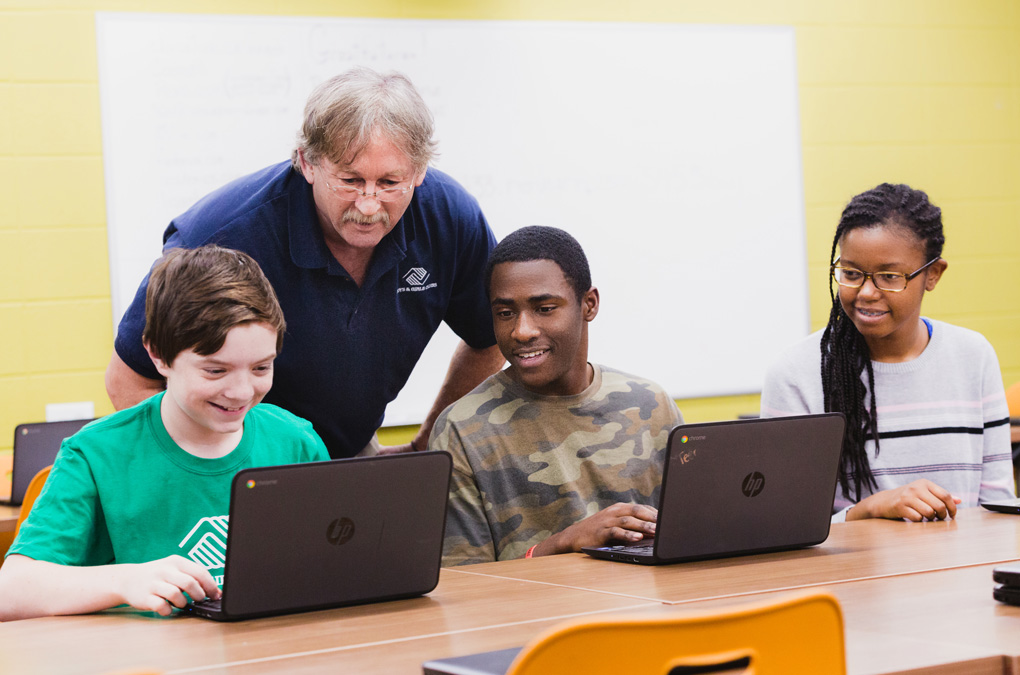Being successful in school is about more than good grades and test scores. Many factors contribute to academic achievement, from attendance and academic support to skills like self-confidence, motivation and resilience.
But how can caregivers influence all these key factors to academic success and set kids up for life after high school graduation? Afterschool programs like Boys & Girls Clubs may be the solution you’re looking for. Just ask one Indiana family for whom the Club has become a home outside of home for all four siblings.
“They are a great example of the power that not only our staff have but our Club programming overall,” says Shanna Groeninger, Director of Development and Marketing at Boys & Girls Club of Evansville.
For the B. family, the welcoming environment and positive adult mentors they found at their Club made all the difference in helping them become the people they are today. Old sister Kabrisha B., now an alum, says, “The Boys & Girls Club kept us calm and safe and made sure we had all the educational support we needed.”
Preparing for Life After High School Graduation
Education beyond high school matters more than ever: by 2031, 72% of all jobs in the U.S. will require the kind of knowledge and skills only possible through post-secondary programs or training.1 Additionally, people with a bachelor’s degree earn 84% more than people with just a high school diploma.
For teens, college prep programs can make a huge difference by creating a path to post-secondary education.
“I was the first person to actually go to college in my family,” says Kabrisha, who says she received a lot of college prep at the Evansville Club.
Afterschool programs provide students with opportunities to engage in activities that may not be offered at school, including exploring educational paths, learning about post-secondary options, visiting college campuses and meeting with guest speakers. More than half of Club teens in 11th and 12th grades report that they have participated in college prep at their Club.
Clubs can also assist with navigating the complex and intimidating process of applying to post-secondary education. This can be especially helpful for youth and parents from households experiencing low income or those who are first generation college students.
As Kabrisha says, “They gave me a lot of resources with scholarships.” Research shows that when teens have help applying for post-secondary admission and financial aid, they are more likely to enroll, attend and complete their post-secondary education.
The Importance of Adult Mentorship
Positive, supportive relationships with trusted adults are another key factor to academic success. This is especially important for teens.
Research shows that teen brains shift to tune in new voices and put less emphasis on their parents.2 It’s one reason why it’s so important for teens to have a support system of trusted adults and peers, which is exactly what they find at their Boys & Girls Club.
Club parent Shannon B. agrees: “I was very comfortable knowing my children were coming to a safe spot with responsible adults and staff.”
Boys & Girls Clubs provide supportive afterschool programs for youth to build these critical relationships. “Adults at the Club are really my mentors here,” says Ai’zsoni B., who’s currently a Club member. “They help me through a lot of stuff. They really change lives.”
It is a snowball effect: when adults hold high expectations of them, young people are more likely to perform well academically and believe in their own success. And when students perform well in school, they’re more confident and motivated to learn. As their confidence and their identity as a learner grow, so do their belief in themselves and expectations for the future.
That’s been the case for the B. family. Kabrisha B. is pursuing her master’s degree in communication. Kiyonce B. attends Indiana State University, majoring in human development and family studies with a minor in counseling. And Ai’zsoni knows exactly what she wants to accomplish: “I plan on going to school for criminal justice with a minor in social work. Basically, I want to be a lawyer that only advocates for children.”
A Multi-Generational Impact
Kabrisha, Kiyonce and Ai’zsoni are just a few examples of the positive outcomes in academic success that Boys & Girls Clubs have supported.
“There are younger kids here that look up to people that used to be here. So, when they see us, their faces just light up and you can tell them ‘I graduated from college’ so they can see that there is a light at the end of the tunnel,” says Kiyonce B.
That’s the kind of compounding impact Boys & Girls Clubs have across the country. With the supportive afterschool programs Clubs provide, every kid can reach their full potential.
Great Futures Start Here
Boys & Girls Clubs of America supports young people and communities year-round through safe and inclusive places, caring mentors and life-enhancing programs. Boys & Girls Clubs empower teens to graduate on time with a plan for the future. Join us in supporting the next generation of change-makers.
Sources
1 https://njbia.org/report-predicts-72-of-all-us-jobs-will-require-postsecondary-education-by-2031/#:~:text=Contact%20Your%20Legislators-,Report%20Predicts%2072%25%20of%20All%20US%20Jobs,Require%20Postsecondary%20Education%20by%202031&text=By%202031%2C%2072%25%20of%20all,(CEW)%20at%20Georgetown%20University
2 https://med.stanford.edu/news/all-news/2022/04/teenager-brain-mother-voice.html#:~:text=unfamiliar%20voices%20Story-,The%20teen%20brain%20tunes%20in%20less%20to%20Mom’s%20voice,to%20unfamiliar%20voices%2C%20study%20finds&text=Around%20age%2013%2C%20kids’%20brains,Stanford%20Medicine%20study%20has%20found



